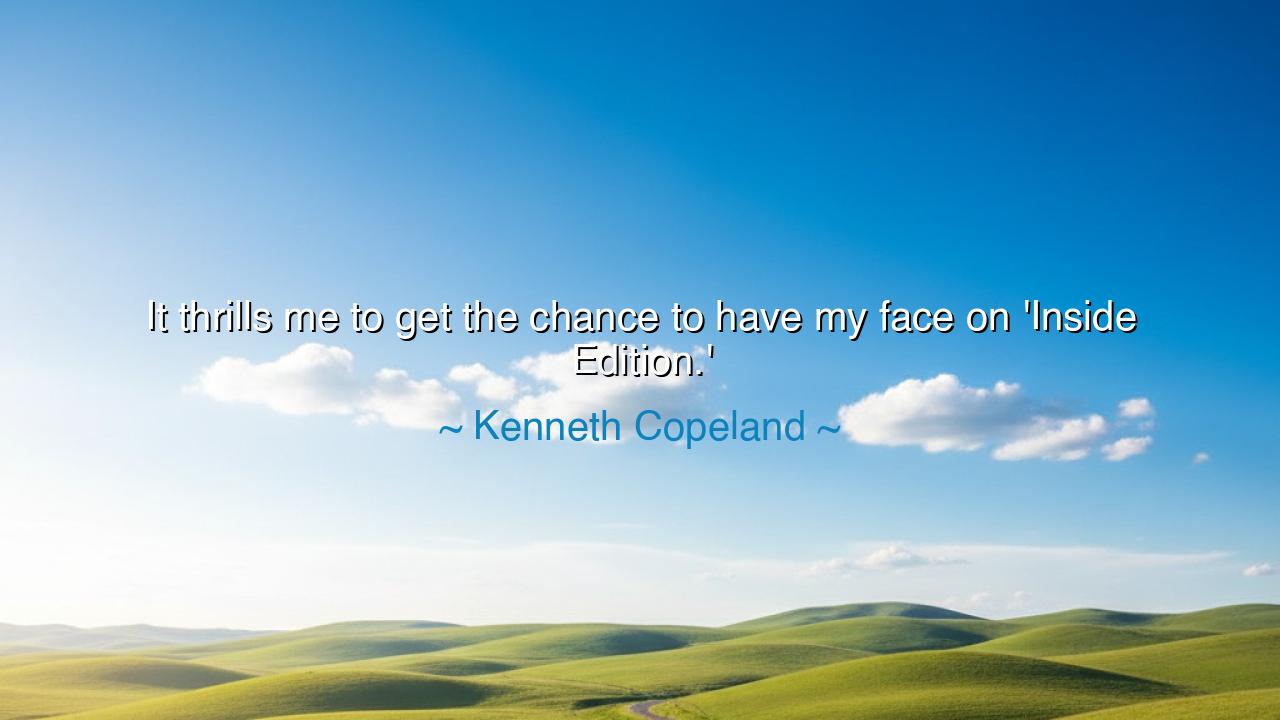
It thrills me to get the chance to have my face on 'Inside






In the grand journey of life, there are moments when one is presented with a chance—a chance to be seen, to be heard, to leave a mark on the world. Kenneth Copeland, a figure whose presence often commands attention, speaks to this thrill when he says: "It thrills me to get the chance to have my face on 'Inside ion.'" These words are filled with the exhilaration of recognition, the joy of visibility, and the power of influence. To be in the public eye is, for many, a dream—a culmination of years of effort, struggle, and determination. But what does this thrill truly mean, and why does it resonate so deeply across time?
In the ancient world, the desire for recognition was not simply a passing whim, but a reflection of a deep human need—to be seen, to be acknowledged for one’s efforts, and to leave a legacy. Alexander the Great, whose name still reverberates across the ages, sought not only to conquer lands but to establish his name in the annals of history. His face—carved into statues, etched into coins—became a symbol of power, achievement, and immortality. Recognition, for Alexander, was not a fleeting pleasure, but a tool to secure his legacy. In much the same way, Copeland's thrill at appearing on Inside ion speaks to a fundamental human longing: the need to be acknowledged for the work one does, to find that the efforts put forth are not just heard, but celebrated.
The ancient Romans too understood the importance of visibility. Leaders such as Julius Caesar were acutely aware of how public image shaped their power and legacy. Caesar, though deeply involved in the day-to-day affairs of his empire, also understood the immense value of being seen, of making sure that his image was ever-present—through public statues, speeches, and coins. His face became a symbol of his rule, and in the same way, Copeland's words remind us that visibility, particularly in a world that thrives on information and media, can often be a source of great power and influence.
But, like the ancient leaders who sought visibility, it is important to understand the true nature of recognition. Is it merely the thrill of seeing one’s image on a screen or in a publication, or is it the deeper satisfaction that comes from knowing one has contributed to the world in a meaningful way? Socrates, the great Greek philosopher, was not interested in the recognition of his own image, yet his ideas have endured for centuries. His recognition came not from his face on coins, but from the ideas and principles he left behind. The difference lies in the motivation—are we seeking recognition for the sake of vanity, or for the sake of impact?
The story of Michelangelo, the renowned Renaissance artist, offers another lesson. Though he painted and sculpted masterpieces that ensured his place in history, Michelangelo did not seek the thrill of fame for its own sake. He sought it as a means to fulfill his higher purpose: to create art that would resonate through the ages, to inspire and to leave a legacy that spoke to the divine. In this way, recognition, for Michelangelo, was a reflection of his mission—not a goal in itself, but a consequence of his devotion to craft and meaning. His work, like Copeland’s, became a vehicle for reaching a broader audience, but his true fulfillment came not from the thrill of exposure, but from the depth and purpose of what he created.
The lesson from Copeland’s words and the stories of ancient and modern figures alike is clear: the thrill of recognition should not be the end, but a means to a greater purpose. When our faces and our names are seen, when our efforts are acknowledged, we must ask ourselves: is the joy of recognition rooted in vanity, or is it a reflection of our dedication to a cause larger than ourselves? Just as Alexander sought to spread Greek culture and Caesar sought to build an empire, we must understand that recognition can be a powerful tool if used wisely—a tool to amplify the message we wish to share, the work we wish to do, and the values we wish to instill in others.
In our own lives, let us not be swayed by the temporary thrill of recognition, but rather focus on the purpose that drives us. Let our faces, our names, and our contributions be visible not for the sake of fleeting praise, but to serve a greater good, to build something that will endure, just as the great figures of history have done. Whether we seek fame, or whether our efforts are more humble, we must remember that the true satisfaction comes not from the applause we receive, but from the impact we make on the lives of others. Let the recognition we receive be a reflection of our integrity, our purpose, and our devotion to making the world a better place.






AAdministratorAdministrator
Welcome, honored guests. Please leave a comment, we will respond soon